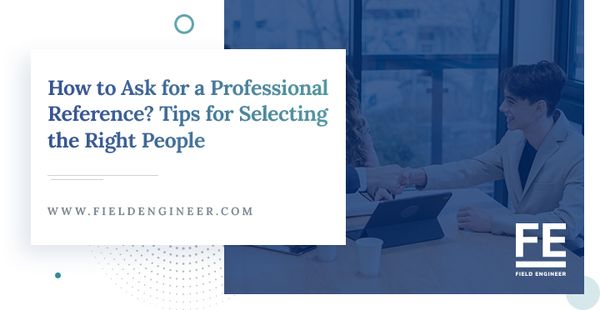How to Ask for a Professional Reference? Tips for Selecting the Right People
Increase your job prospects with a professional reference! Employers rely on them to assess your skills and character. Learn How to Ask for a Professional Reference and choose the right references to boost your job market.
Securing a job can be a challenging process, especially when you're competing against other qualified candidates. So, how can you stand out from the crowd and increase your chances of getting hired? One important tool that can make a significant difference is a professional reference.
When employers are considering hiring a new candidate, they often rely on more than just resumes and interviews. They want to hear from others who have worked with you and can vouch for your skills, work ethic, and character. This is where a professional reference comes into play.
A professional reference is a powerful asset that can help you secure a job by giving employers an unbiased perspective on your abilities and suitability for the role. It goes beyond your self-presentation and adds credibility to your application. Whether a recent graduate or an experienced professional, understanding the importance of a professional reference and utilizing it effectively can give you a significant advantage in the job market. In this article, we will discuss how to ask for a professional reference and valuable tips to help you select the right people for your references, ensuring you make a favorable impression on potential employers.
What Is a Professional Reference?
A professional reference is an individual who can positively reflect your skills and abilities as a professional. They should be someone who can speak to concrete examples of the strengths and experience that you've brought to a particular position or field. Professional references can include people who you have worked with in a paid capacity, such as previous employers, supervisors, coworkers, clients, or vendors. Volunteering experiences also qualify for providing a professional reference; anyone who can attest to your commitment and reliability in pursuing a goal can serve as an effective reference.
Whether through formally structured positions or casual volunteer opportunities, the quality of your work is noteworthy enough that someone acknowledges its contribution before being prompted by an application. This could help paint an all-encompassing outline of who you are as an employee and person living outside the workplace. It's then important to think carefully about who you ask for this type of recommendation and foster these connections over time for future opportunities requiring professional references. Ensure they are familiar with your achievements and traits required for success in any given role at whatever level; if they are capable, these references may be used repeatedly in similar positions.
Why do Organizations Request References From Job Candidates?
Businesses ask for references as a way to gain a more comprehensive understanding of the candidate's suitability for the position. References allow them to get an unbiased perspective on performance, strengths, weaknesses, values, and how the applicant may fit into the company's aesthetics. As such, after a successful interview, employers typically contact former or current supervisor(s) to gain some insight into who you are both professionally and as an individual. This can provide them with invaluable information that goes beyond what is discussed in your resume or even during the interview process.
Employers want to know if your work style is compatible with the type of job you are applying for and if your professional ethics match those you hold as a company. Additionally, speaking with references will enable them to gauge how much other people think of you at different workplaces and how well you interact with coworkers and superiors. When all these factors come together, it helps employers form an image of what it's like working alongside you and whether or not it aligns with their company culture and goals. By analyzing this data, employers can better choose who best suits their needs while providing potential employees a pathway toward success.
Who Should I List as My Reference When Applying for a Job?
Most employers ask for references when considering a job applicant, and making sure you list the right references could be the difference between getting the job and not. When choosing who to use as a job reference, your choices must be strategic. Choosing people who can speak positively of your professional ability is essential, so having solid relationships with past bosses, coworkers, teachers, and other relevant acquaintances is essential for providing quality references.
You may choose to leave off some prior positions from your resume when applying for jobs due to employment gaps or negative work experiences. While this will help minimize potential red flags for employers, it also reduces the number of possible references you have. In these cases, try contacting people who know your work ethic in an unrelated professional setting, such as volunteer organizations and networking groups. These types of professionals can provide valuable insight into your character and aptitude that might not come from other sources. It also helps if they have a neutral opinion of you so their reference seems unbiased and personalized rather than pre-prepared.
How to Choose Job References - Tips & Best Practices
Here are a few tips on how to choose job references:
Consult the appropriate individuals
When you’re looking for important job references, it pays to ask the right people. Begin by approaching those who have seen you thrive in work scenarios – that could be ex-managers and team leaders who have watched your skills, dedication, and contributions to your workplace first-hand. Don’t forget to check in with peers and colleagues as well – they may not have any direct influence on how well you can do any job, but they can provide a valuable perspective on working in teams and the ability to solve problems.
Selecting references from recent roles is best, so ensure their feedback paints a picture of your current skill set. Referees should be able to confidently tell your professional story and show what makes them good for representatives – pick individuals whose connection with your journey resonates. Job references give weight to your narrative: invest time in choosing the right people for the job!
Seek approval before proceeding
For many reasons, asking for permission before listing someone as a professional reference is essential. To start, it’s a courtesy and respectful gesture that ensures the person is willing to stand behind you and your capabilities. This act of respect also allows them to update their contact information and get briefed about the specific job. Additionally, it will enable them to create a bespoke recommendation tailored specifically for you and the job at hand. Moreover, this practice demonstrates that you respect their opinion and value their input; as such, it nurtures trust in any professional relationship between you two.
It goes without saying that securing someone’s consent beforehand helps build confidence when talking about references or providing recommendations in interviews or on applications. These recommendations are more genuine and provide an affirmative outlook on your character, which can significantly influence the hiring decision-making process.
Get your references ready
When it comes to choosing a professional reference, it’s essential that you make the right selection. Acting as a spokesperson for your career, this individual should not only be informed but also well-aligned with your skills and potential. To ensure that this is achieved, begin by initiating a conversation with whomever you plan on asking to become your reference. This dialogue should extend past just a mere request for permission and be used as an opportunity to both renew any prior connections that have been established with them and familiarize them with the trajectory of your career.
Moreover, when explaining the position you are pursuing and the value system held by the company for which you are applying, make sure to communicate these details in order to assist your reference in tailoring their endorsement more effectively. Not only will they be able to better highlight the work you had previously done, but they will also be able to express their faith in what you could potentially achieve in holding the job that you’re applying for.
Ensure that your references can speak positively about you
A good reference is crucial when you're applying for a job. Before you list anyone as a professional reference, it's important to have an open discussion and make sure they can confidently provide a positive review of your skills and work ethic. This conversation provides valuable insight into their sentiment regarding you and can be extremely telling. When you choose someone for the role of reference, you want them to speak highly of your capabilities, as it adds another layer of credibility to their application package.
Many people underestimate the tremendous power that references can wield during the job process. Their words carry weight and give potential employees an idea about how well they might fit in at the company. As such, all parts of your job application–resume, interviews, and references–must come together to tell one amazing story about who you are as an employee. A glowing reference helps add the final touches to what could potentially be the career-defining opportunity you've been working towards.
Never forget to express your gratitude
Compassion, gratitude, and giving back are essential to professional success. By showing appreciation for someone who has provided you with a reference, you can demonstrate your commitment to maintaining close relationships and increasing your network within the industry.
Expressing gratitude doesn’t just acknowledge a vital gesture – it allows people to see the good work others do on your behalf. Others will surely remember this form of respect in your field for years to come. Additionally, having the humility to practice such courteous behavior reinforces a trustworthy reputation for yourself.
The connection between expressing thankfulness and reciprocity cannot be underestimated. Everyone likes to feel appreciated and valued; paying it forward may even influence those around you to spread this same level of consideration. Most importantly, though, displaying courtesy through offering sincere appreciation conveys a sense of understanding and empathy in both personal and professional relationships. It proves that we aren’t alone in our journey and provides us with much-needed encouragement during difficult times. Showing appreciation always has lasting effects - both immediate and long-term - so make sure you don’t forget its importance in any situation!
How to Ask for a Professional Reference - Tips and Tricks
Here are some tips to help you on how to ask for a professional references:
Opt for the right means of communication
When it comes to deciding the right medium for contacting someone, the relationship between you and that person is an important factor to take into account. If you are close friends or acquaintances, a phone call is generally a better choice as it tends to be more personal and direct. You will be able to discern the tone in their voice, and they may be more likely to respond quickly than if they received an email.
On the other hand, if your request is more business-oriented or formal, such as asking for a reference, then sending an email may be preferable. This provides a professional appearance and gives them time to consider your request before responding. Furthermore, emails have better tracking capabilities, so you can easily track who has been contacted and when. Therefore, it is important to assess your relationship with the person while choosing the most appropriate way of communication in order to ensure your message gets through successfully.
Timing plays a vital role
Timing is an essential factor when reaching out to your professional reference. To ensure the best possible outcome, choosing a good time to approach them is important. First and foremost, you should avoid contacting them during busy hours or stressful times. When finally getting in touch, suggest a quick coffee catch-up if possible - this allows both parties to have an undisturbed conversation and less chance of being interrupted by other commitments. Alternatively, if over the phone, mandating that they have a few free moments to discuss details would be ideal. This allows your reference to give their full attention when speaking with you about their experiences as an employee/volunteer.
At the end of the day, timing is key here; establish this before having any kind of conversation about your professional references - it will serve as a great asset in forming successful relationships with your referees according to what they are comfortable with! Being respectful of someone's time constraints and occupying just enough space allows for more personalization throughout the entire process from start to finish, creating a mutually beneficial exchange between yourself and your reference.
Individualize your approach
When asking for a reference from potential employers, it is important to personalize your approach according to the relationship you have with your reference. This means that the way in which you contact and interact with them should vary depending on whether they are a former colleague or an ex-boss. For instance, if the individual is someone you have developed a close relationship with, you can be more informal in your communication with them and during any face-to-face meetings. However, it is still essential to maintain professionalism when dealing with all references, regardless of your connection with them.
On the other hand, when seeking a reference from someone you previously worked under or who was your superior in some way, it is important to remain polite and respectful throughout. This includes properly introducing yourself and providing background information about why the individual or company employed you. It also implies taking extra care not to make any requests that might appear too casual or offhand – such as dropping by their office unannounced – to avoid offending or making them uncomfortable. Remember that these individuals offer their professional opinion of you and deserve respect.
Foster the Relationship
The relationships you have with people who provide professional references for you are often overlooked but shouldn't be. Keeping in touch and even checking in with these individuals is invaluable to your reputation and future success. At a minimum, send thank-you notes after they have offered a reference for you. That will show them that you recognize and appreciate their hard work on your behalf. Additionally, offering them updates on your life - such as landing a new job or promotion or other news - will help maintain that connection between you over time.
Similarly, be sure to look for opportunities to reciprocate the help. Whether it's staying in touch and offering advice as needed or helping someone with an introduction to another person in their network, providing something back to those who have offered references for you can make a lasting impact. Maintaining relationships is one of the cornerstones of successful networking, so investing yourself in those relationships is crucial if you want to build meaningful connections.
Set them up for accomplishment
Providing potential references with relevant materials is a surefire way to help equip them for success. It demonstrates your trust in their ability to speak positively on your behalf and gives them the tangible ammunition they need to assemble a compelling story. This arsenal of information can include projects you worked on together, significant accomplishments, or even challenges you overcame that helped you gain new insight and skill sets – that proves invaluable in reference check conversations.
By equipping your references with these pieces of information, it will be easier for them to communicate a clear picture of why you are an ideal candidate for any job you are vying for. They can describe specific skills and expertise that make you have standout qualities and provide insights into how well you responded to criticism or worked alongside others. These details give flexibility when talking about your character, allowing the individual giving reference to authentically reflect their opinion with personal experience rather than rehearsed statements. Ultimately, providing pertinent details can enable a more meaningful evaluation process and increase the chance of success.
Understanding matters most
Empathy is essential in any business or personal interaction that involves parties with different perspectives. It can enable us to better understand the feelings, motives and experiences of others. When attempting to reach a successful agreement or understanding between people, it is important to remain mindful of each other's needs. A core aspect of empathy towards someone else is actively listening and considering their response without being judgemental or taking things personally.
When conversing with a potential partner or colleague, being flexible and allowing for their response is important. Even if they hesitate or decline, we should try not to take this as incriminating our proposal but instead, pause and listen for underlying reasons. These may include anything from company policy decisions, fear of change, practical restrictions, or personal comfort levels, amongst other reasons. Taking an empathetic approach when conversing with others can go a long way towards understanding their perspective and ultimately facilitating more successful engagements between all parties involved.
How Many References Should You Have?
When answering the question of how many references one should have, it is important to remember that the number may vary based on a few factors, such as job industry and job requirements. Most employers will ask for two to three professional references as a general guideline. It’s a good idea to have at least three references ready to demonstrate how diverse your experience has been. Those references should also include a mix of recent supervisory roles, colleagues, or even subordinates if applicable. Having more than one reference can help potential employers gain insight into their candidate's overall work ethic and success rate with different types of jobs.
For example, having multiple former supervisors can allow an employer to see how you handled pressure in certain situations, which could be beneficial when evaluating your candidacy for their company. Additionally, having colleagues and employees enables them to get a sense of your outlook when navigating through co-worker relationships and working competently with others in similar roles. Providing references from all areas allows potential employers to gain context about how your role was valued within different corporate structures over time too. Ultimately, having various types of well-rounded contacts can help give an accurate visual into your career journey thus far.
Conclusion
Having professional references that can vouch for your work ethic and ability is a very important part of any job application. You should be selective in choosing the people who will provide references for you, as it could make or break your chances of landing the job. When you have determined who your references are going to be, do not list them on your resume. Instead, assemble a reference page that clearly lists out each person's name, contact information, and how they know you professionally. You can find helpful reference page templates online that help you organize this information.
Once you have chosen the right referees and created an organized reference page, it is time to start applying for jobs! Make sure to keep all documents up-to-date, as employers may ask to contact your referees at any stage in the application process. Best of luck with your job search!








